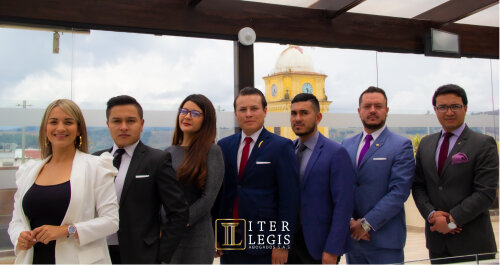Best Venture Capital Lawyers in Tunja
Share your needs with us, get contacted by law firms.
Free. Takes 2 min.
List of the best lawyers in Tunja, Colombia
About Venture Capital Law in Tunja, Colombia
Venture capital law in Tunja, Colombia governs the legal relationships and structures associated with funding startups and early-stage companies. Venture capital involves investors providing capital to entrepreneurs in exchange for equity ownership or convertible debt. While Tunja is a growing business hub within the Boyacá region, most venture capital activity follows national Colombian law, with specialized attention to local regulations. The legal environment supports innovation, but it requires careful navigation to ensure protection for both investors and entrepreneurs.
Why You May Need a Lawyer
Legal assistance in venture capital matters is crucial for several reasons. Whether you are an entrepreneur seeking funding or an investor looking to support growing businesses, legal counsel helps protect your interests. Common situations include:
- Drafting investment agreements
- Structuring startups for investment-readiness
- Navigating government incentives and compliance requirements
- Negotiating shareholder agreements and term sheets
- Ensuring proper intellectual property protection
- Handling disputes between founders or between investors and entrepreneurs
- Conducting due diligence prior to investment
A lawyer can help you avoid costly mistakes, ensure your transactions comply with local and national laws, and provide guidance specific to the Boyacá region.
Local Laws Overview
In Colombia, venture capital activities are governed by national laws, but regional practices in Tunja can influence the legal landscape. Key legal aspects relevant to venture capital include:
- Company Structures: Most startups use a Simplified Stock Company (SAS) structure, favored for its operational flexibility and investor-friendly framework.
- Foreign Investment Laws: Colombia welcomes foreign capital, but investors must comply with registration and reporting obligations set by the Banco de la República and DIAN (tax authority).
- Securities Regulation: Equity offerings are regulated, and certain fundraising activities may require compliance with securities regulations, even in private placements.
- Intellectual Property: Securing IP rights locally is key for startups, ensuring protection and value for investors.
- Taxation: Various incentives may be available for startups, especially those involved in innovation or technology. Proper legal planning helps optimize tax obligations.
- Employment Laws: Startups must comply with labor regulations, which can impact structuring and growth strategies.
Local authorities in Tunja may offer support to entrepreneurs, but much of the regulatory environment is consistent with broader Colombian legal frameworks.
Frequently Asked Questions
What is venture capital and how does it work in Tunja?
Venture capital refers to funding provided by investors to startups and small businesses with high growth potential, often in exchange for equity. In Tunja, this is done through formal agreements in compliance with Colombian law, usually targeting innovative or technology-driven enterprises.
Can foreign investors participate in venture capital deals in Tunja?
Yes, foreign investors can participate. They must comply with currency registration, reporting, and tax obligations to ensure their investments are recognized and protected under Colombian law.
What legal structure is recommended for startups seeking venture capital in Tunja?
The Simplified Stock Company (Sociedad por Acciones Simplificada, SAS) is widely recommended due to its flexibility, ease of incorporation, and attractiveness to investors.
Are there government incentives for startups or investors in Tunja?
Yes, there are grants, tax breaks, and innovation support programs at both the local and national levels, especially for technology and innovation-driven startups. Professional advice will help you access and comply with these incentives.
Do venture capital agreements need to be notarized or registered?
Foundational company documents and changes in equity structure often require notarization and registration with the Chamber of Commerce. Most investment agreements should be formalized in writing to ensure enforceability.
How is intellectual property protected in a Colombian startup?
Startups must register their trademarks, patents, or copyrights with the Superintendence of Industry and Commerce (SIC). Proper IP registration is essential before seeking venture capital.
What legal risks should investors and founders be aware of?
Risks include unclear company ownership, lack of IP protection, non-compliance with labor or tax laws, and ambiguous shareholder agreements. Legal assistance helps mitigate these risks.
What is a term sheet and why is it important?
A term sheet outlines the fundamental terms and conditions of a proposed investment. It serves as a blueprint for the final agreement and helps both parties negotiate key points before binding contracts are signed.
How should disputes between founders or investors be handled?
Disputes can be addressed through mediation, arbitration, or courts. Well-drafted shareholder agreements often include dispute resolution mechanisms to handle conflicts efficiently.
Do startups need to publish financial information publicly?
Most private startups do not have public disclosure requirements, but they must maintain accurate records and provide information to investors and relevant authorities as required by law.
Additional Resources
If you are seeking more information or assistance regarding venture capital in Tunja, consider contacting the following:
- Chamber of Commerce of Tunja (Cámara de Comercio de Tunja) for company formation and registration guidance.
- Colombian Superintendence of Industry and Commerce (SIC) for intellectual property matters.
- Banco de la República for issues related to foreign investment registration.
- Colombian Ministry of Commerce, Industry and Tourism for innovation programs and incentives.
- Invest in Boyacá or local entrepreneurship incubators for networking and support.
- University of Boyacá business support centers for legal and business advisory services.
Next Steps
If you are considering venture capital activity in Tunja, Colombia, your next steps should include:
- Clearly define your business objectives or investment goals.
- Gather relevant documentation, such as company bylaws and intellectual property registrations.
- Consult with a lawyer experienced in venture capital and local regulations in Tunja.
- Discuss your plans with local business support organizations for additional guidance.
- Ensure all agreements and company structures meet legal requirements to protect your interests moving forward.
Early legal advice is the best way to ensure a successful and secure venture capital process, avoiding pitfalls and maximizing the benefits for all parties involved.
Lawzana helps you find the best lawyers and law firms in Tunja through a curated and pre-screened list of qualified legal professionals. Our platform offers rankings and detailed profiles of attorneys and law firms, allowing you to compare based on practice areas, including Venture Capital, experience, and client feedback.
Each profile includes a description of the firm's areas of practice, client reviews, team members and partners, year of establishment, spoken languages, office locations, contact information, social media presence, and any published articles or resources. Most firms on our platform speak English and are experienced in both local and international legal matters.
Get a quote from top-rated law firms in Tunja, Colombia — quickly, securely, and without unnecessary hassle.
Disclaimer:
The information provided on this page is for general informational purposes only and does not constitute legal advice. While we strive to ensure the accuracy and relevance of the content, legal information may change over time, and interpretations of the law can vary. You should always consult with a qualified legal professional for advice specific to your situation.
We disclaim all liability for actions taken or not taken based on the content of this page. If you believe any information is incorrect or outdated, please contact us, and we will review and update it where appropriate.









